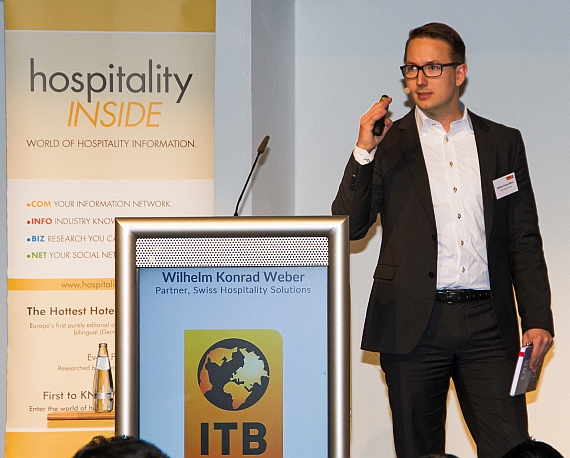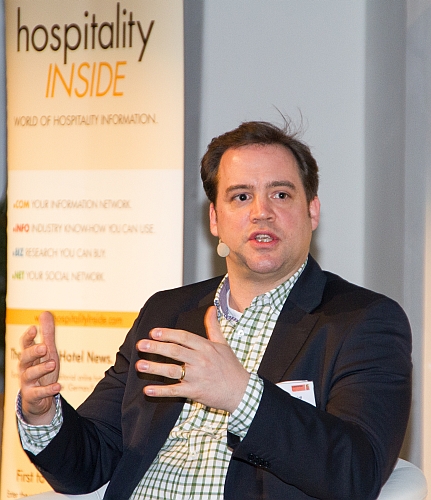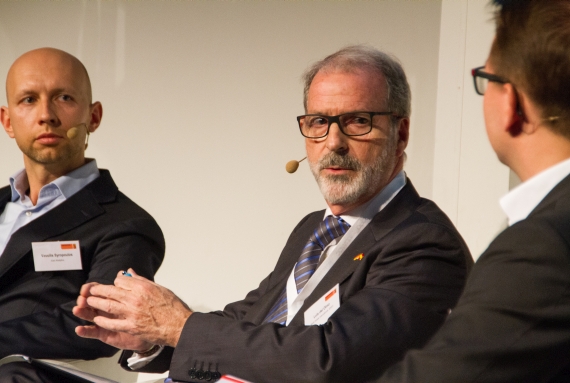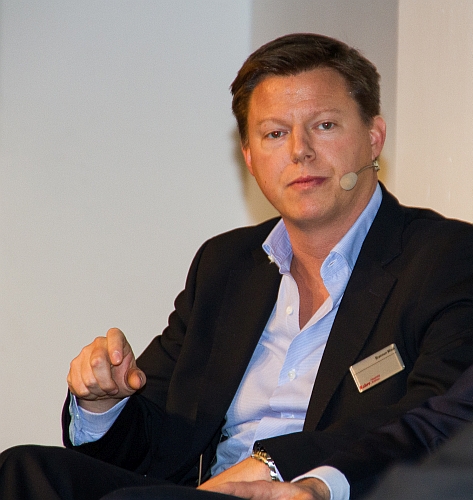ITB Hospitality Day 2015: Only a minority believes in own distribution power
 |
|
| Provocative moderator: Wilhelm Konrad Weber. |
Berlin (March 20, 2015). Online Travel Agents (OTAs) that do not want to be such consider as such are afraid of system operators such as Google or Android which could turn out to be the true powers of evil that could make the hotel industry depend on them in the future. The intense "ITB Hospitality Day" at ITB 2015 was coming to an end when an illustrious panel addressed the question whether the independence of the hotel industry was in the process of nearing its end as well. Trusting the vote of the audience at the end, this question must be answered with a clear yes: only 26 percent expect the hotel sector to generate the majority of reservations by itself.
Half of the discussion was over before Tom Breckwoldt, Regional Manager TripAdvisor, came out of the woods: "Hotels want to be professional distributors, too. But the question is whether they are really capable of doing it. Hotels would be better off, if they focused on their core business," he said alarmingly. The hotels should make peace with distributors, he added.
As Peter Verhoeven of Booking.com was absent due to illness, TripAdvisor was partly the focus of the discussion. Host Wilhelm Konrad Weber, Swiss Hospitality Solutions, deliberately provoked Breckwoldt by blaming TripAdvisor for an unclear position: "One time TripAdvisor is an OTA, the next time it is not" – depending on whether they referred to customers or hotels.
"We concentrate on the community, which is why we've never considered ourselves an OTA. And we'll never be one, as we follow a different kind of logic," said Breckwoldt insisting on the company's unchanged business idea of being an evaluation platform. Of course, the company was constantly developing innovations simplifying hotel reservations. "Our bonus option – already launched in the US – is called 'instant booking'." Trip Advisor is convinced that "it will change our world within the next two months."
 |
|
| Tom Breckwoldt: TripAdvisor will change the landscape soon... |
Dispute about TripAdvisor's role
Instant booking led directly to the reservation system, however, TripAdvisor wants to keep offering the solutions developed before: the listing for customers or the costs-per-click (CPC) solution showing availability to customers. "Instant booking means we transfer a reservation to our partners and to the hotel's reservation system, respectively. Travellers directly receive the confirmation. Further communication and payment – everything is direct," said Breckwoldt emphasising the difference to online travel agencies. Basically, it is all about choice. Of course, there are commissions that will not be doubled by the intermediate online portal, but shared with it.
This answer, however, failed to convince the other panelists. The cash flow was in fact a technical issue. "But that doesn't change my opinion that TripAdvisor is in fact an OTA," said Vassilis Syropoulus, founder of the Juyo Analytics software company.
Travels were a vertical business. TripAdvisor acted the same way and wanted to take the largest piece of the action for itself.
"Consumers obviously consider TripAdvisor a travel agency. The same is true for us hoteliers, as we want to be right on top of their listing," said Luis del Olmo, Executive Vice President Group Marketing of Meliá Hotels and Executive Chairman of the new IDISO IT subsidiary.
Pushing the right buttons
Del Olmo was mainly concerned with the hotel sector's growing dependence on external online distribution: "Being a hotel business, we had no research and development department, which is why we were at the mercy of the computer era." Meliá had totally re-vamped its digital appearance at the turn of the millennium. "We founded IDISO as a joint venture company, as we don't want to pump five million euros into the Internet each year. But being a hotel owner I want to decide on my future myself, each and every moment, on how I market my free rooms," said del Olmo, who compared the role of a hotel manager to the Formula 1. "There are many buttons I don't understand. But I'm the one to push them."
You needed to cope with the technological possibilities, but instead of inventing everything new, you should purchase it. "But I'd never think about delegating the website to Booking.com," he warned providing a current example. TripAdvisor had managed its communication with customers in this way, carefully observing their reactions, but it had missed using the channel for building up customer loyalty and accumulating knowledge about customers: "Forget big data, maintain the small data instead," recommended del Olmo.
 |
|
| Software expert Vassilis Syropoulos (left) sees the danger of Google or Android, Meliá hotelier Luis del Olmo prefers to influence the handling of data. |
Dependence from
mobile data collectors
Perfect solutions were quite rare in the hotel sector. "Some hotels run loyalty programmes, others use cookies. After all, everybody could draw more information than just the name," emphasized Brannon Winn, Vice President EMEA of Sabre Hospitality. His contributions were a plea in favour of using all the channels to establish contact to consumers. "Of course we invest regularly, for example to find out more about the purchase behaviour of millennials." Mobile was the message of the hour.
Breckwoldt also underlined that we were still living in a desktop world, whereas more and more mobile data were being collected. "Thus, the question of how relevant these data are to me is the key. Otherwise, the screen gets too small." The future belonged to technologies enabling a wrist-watch to tell you the best way to reach your destination. And somewhere, the data are being stored and analysed in order to second-guess people's future buying behaviour. In this respect, a certain dependency was to be most feared here.
"Operator-based systems like Google or Android will become decisive," said software expert Vassilis Syropoulos. Information gathered via Google Maps would get processed – the big step into the market of hotel distribution. "They will not take over our world of distribution, but beat it." Del Olmo referred to another aspect: Google & Co's incredible speed of innovation. Currently, consumers were bombarded by marketing. Over time, this could turn counterproductive and even lead to aversion among customers.
In contrast, del Olmo showed no fear with respect to Amazon as a new player in terms of room sales. There were also shopping malls with travel agencies in "real life". "There is room for everyone, and each day there is a new surprise, such as hotels in Spain being marketed via Airbnb," he added.
 |
|
| Brannon Winn, Sabre Hospitality: Mobile will decide the game. |
Distribution costs to climb further
Syropoulos considers everything in a constant state of flux. However, when it comes to measurements, the hotel industry was extremely conservative. "But it has to prepare for consolidation over the next two years, in each area. For hoteliers, this means that distribution costs will climb further." The trend accelerated even more, but only few had met any preparations, he painted a bleak picture. It was all about optimising the use of distribution channels.
There was common agreement that room providers should not become dependent on the reservation method. "If you want everything to run via your own website, you miss chances," said Brannon Winn.
Maybe, the vote on the "future (in)dependence" of the hotel industry should not have been carried out during the discussion, but twice instead – at the beginning and end of the discussion. It would have been interesting to learn whether the audience would have changed its opinion. The panelists commented the result of the vote in a differentiated way depending on their position. Syropoulos spotted "at least 26 percent optimists" in the audience. Winn considered the voters realists, whereas the mix leads to success. Del Olmo, in turn, said cautiously: "Many people wish hotel reservations to be carried out directly by the hotels in future, as this would mean independence." But, of course, this was also a question of what price consumers were willing to pay. / Fred Fettner
You will find the YouTube video about this panel in full length under this direct link or at www.itb-convention.com !
Continuative Links:
- April 10, 2015 Hotel industry out of touch-10th ITB Hospitality Day 2015: The Sharing Economy wave making everyone sweat
- March 27, 2015 Continual re-inventions-10th ITB Hospitality Day: Lifestyle communication with budget and luxury
- March 27, 2015 Digitised and still human-10th ITB Hospitality Day: IT and emotions create new hotel concepts
- March 13, 2015 Good base for hackers: ITB Hospitality Day 2015 revealed how to crack codes and webcams
To print this article you have to be registered and logged in for newsletter, visitor or subscription.





